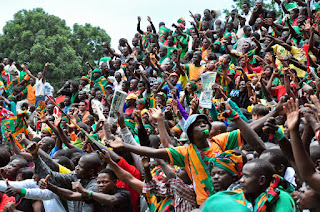A friend, quoting a guidebook, once described Lusaka as a city that “does not easily lend itself to superlatives.” I can see where they were coming from. Nothing about this place screams “look at me- this is Lusaka!” Nothing is overly big, loud, impressive or intense. There is no iconic monument, landmark or scenery. Hell, when a new mall opens, that’s big news here. In the most affectionate way possible, I would call it a tame town. However, there is one uniquely interesting thing about this place, something that sets it apart from anywhere I’ve ever been. In truth, it’s actually two cities sidled up right next to each other; more “twin cities” than Minneapolis and St. Paul. Sure they share infrastructure, government and a porous border, but that’s where the similarity ends. They are a metropolitan odd couple; two towns with two very different, though constantly intersecting, stories.
On the one hand is the city in which I usually find myself. A glorified urban sprawl revolving around strip malls and shopping centers. It stretches for many times the area of its neighbor, full of spacious residences and unclaimed land. Its roads are well maintained and the traffic lights work. There are shade trees, manicured lawns and gate after wall after gate, all crowned with razor wire. The people you see are usually in vehicles, and on the road you pass 4x4s one after another. Its restaurants have names like Portico and Plates and serve up delicious meals alongside cappuccinos and milkshakes. Within its shops, you can locate just about any appliance, convenience or luxury you could desire. Of course, this is sometimes a metaphorical city as much as a literal one, as its limits do not always follow strict geographical boundaries.
The other city, the one I rarely visit, is a fraction of the size but infinitely more dense. It's located to the west, straddling the largest north-south roads, and was once the center of all Lusaka. It is full of cars and people and stores and people and concrete and people. Every square inch of every block is utilized. There are shops within restaurants and restaurants within shops. Sidewalks double as merchandise displays, parking spaces and eateries. Cars are double, sometimes triple parked and roads back up behind slow moving buses. Even the walls are full; painted edge to edge with shop names and products images. All around there are people. You are swept along in a current of life, business, movement, color, noise, smell. You could wander this riotous labyrinth endlessly, always discovering something new.
To be honest, in one of these cities I feel comfortable and at home; in the other, I am a total stranger. I can blame my detachment on the miserable traffic, the lack of parking, the many convenient alternatives closer to home. Perhaps, though, it could be that where I live and spend most of my days is not too different from where I once lived, and where I avoid is the honest truth about where I live now. Walking around downtown today, I realized I need to find a better balance. Even after seven months, I’m just beginning to learn what it means to live in Lusaka.









